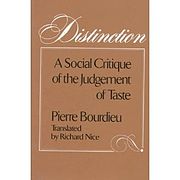- La Distinction
-
La Distinction 
English coverAuthor(s) Pierre Bourdieu Language French Subject(s) Sociology La Distinction is a book by French sociologist Pierre Bourdieu (1930–2002), based on Bourdieu's empirical research on French culture. Taken from studies conducted by Bourdieu in 1963 and concluded in 1967-68, the book was originally published in France in 1979. Richard Nice translated the work into English, and it appeared in the United States in 1984 under the title Distinction: A Social Critique of the Judgement of Taste. In 1998 the International Sociological Association voted it one of the ten most important sociological books of the 20th century.
Contents
Summary
In his often densely worded prose, Bourdieu discusses how those in power define aesthetic concepts such as taste. Referring to surveys of French citizens from different economic and educational backgrounds, he shows how social class tends to determine a person's likes and interests, and how distinctions based on social class get reinforced in daily life. He observes that even when the subordinate classes may seem to have their own particular idea of good taste, "the working-class 'aesthetic' is a dominated 'aesthetic' which is constantly obliged to define itself in terms of the dominant aesthetics..." [1]
Theory
Bourdieu claims that aesthetic choices both create class-based social groups or "class fractions," and actively distance people in one class from another. Predispositions to certain kinds of food, music, and art are instilled at an early age in children and guide them to their appropriate social positions, by forcing them to internalize a preference for objects and behaviors that are suitable for them and an aversion towards the preferred objects and behaviors of other classes. When an individual encounters the culture or art of another class, he or she feels "disgust provoked by horror or visceral intolerance (‘feeling sick’) of the tastes of others."[2]
Taste is an important example of how class fractions are determined not only by social and economic capital, but also cultural capital, a more insidious mechanism for ensuring social and cultural reproduction. Because tastes are learned early and internalized to such a high degree, they are much more difficult to change and thus tend to permanently mark people of certain classes and impede their social mobility. In this way, the tastes of the dominant class tend to dominate those of the other classes, forcing individuals in economically and culturally dominated class strata to conform to certain aesthetic preferences at the risk of appearing crude, vulgar, or tasteless.
Notes
External links
Categories:- Sociology book stubs
- Sociology books
Wikimedia Foundation. 2010.
